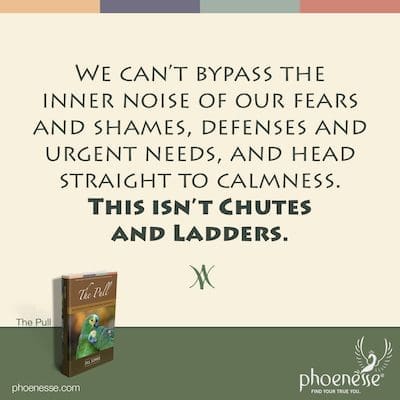When we’re in a state of being blocked and barricaded, blessings of love could smack us upside the head and we wouldn’t feel it. Our senses become dulled by our fears and shame, and our urgent wishes that things be other than they are. We defend ourselves against the way life is, but our defenses are built on erroneous conclusions and confusions.

The greatest words of wisdom, though, can only become a living truth in us if we allow ourselves to feel our feelings and find the misconceptions that support them. This is not an intellectual exercise and our problems didn’t originate yesterday. We must unearth the untruths we’ve been harboring our whole lives. And with the awareness, we’ll be closer to tapping into the love current that surrounds us, inside and out.
Each one of us holds a well of wisdom and love within. It’s a treasure buried safely in our souls that we can access any time we clear away whatever blocks us from it. We’re the ones barring it from ourselves. We’re so used to looking outside ourselves to find truth and guidance and solutions to our problems—through wise teachings or a helping hand. But all the most reliable and realistic answers are already there, inside us. In order to tap into that well, we need outside help. But it’s only valuable if it helps us reach our core—the source of the treasure within.
To tap that well, we must walk a path of self-confrontation. What else? We must seek calmness, in and out. Every day, we can take time to become still and enter into meditation, allowing the inner noise that covers our well of wisdom and love to be heard. By listening and translating this noise into clear thoughts, our meditations will lift out of that well wise guidance and warm feelings of love, affection and understanding. Then our own urgent needs won’t get in the way of our having realistic perceptions of others.
There are no shortcuts. This isn’t Chutes and Ladders. We can’t bypass the inner noise of our fears and shames, defenses and urgent needs, hoping to belly right up to the bar of calmness. That’s not how we get to the inner treasure. We may kid ourselves that we can do so, but that doesn’t make it real.
No, we’re going to need to acknowledge our barriers and the associated noise. We must do this in a relaxed open way and then work to translate its meaning. That’s the only way. We may need to start by becoming calm enough to determine why we’re so set against becoming calm. However we go about it, we must not neglect this practice of calming ourselves, listening and sorting. It will help us greatly.
Early on our journey of self-knowing, we discover how harmful our barriers are. We first focus the spotlight on ourselves and begin to do our own inner work. Then, when we’re ready, we can look at how our barriers affect our relationships with others. Because we all know, often all too well, that this is where the rubber meets the road. Our unhappiness and confusions are always connected with how hard it can be to cope with our fellow-creatures.
When we sit and calmly observe how we react to others, we’re bound to notice something like an inner cramp, a tension. It’s not hard to imagine how that’s going to make it tough to open up and meet others without restrictions. Instead, we tend to become grabby and demanding. Which is always so inviting.
Our urgent demands stop us from giving without fear. And yet, it is only when we’re willing to meet others with love that our lives can become fulfilling—no matter how worthy our outer activities may otherwise be.
So what is this fear about? In general, it is always saying, “But there are people who take advantage of warm, loving feelings. I need to guard myself and not allow myself to feel, or I will suffer.” But this is so untrue. Yet untruths like this clog up access to our inner well of wise guidance and reliable intuition. Such misunderstandings are what foil our communications with others and keep us isolated. Then thick layers of unfelt feelings pile up. The only remedy is to start digging through all the layers using our conscious goodwill and understanding. Because we can’t possibly be happy living in no-man’s land.
Notice though that our reluctance to deep loving communication goes beyond our fear of suffering and being hurt or disappointed. In fact, there are three further aspects we need to become aware of for why we say No to loving. Each of these three aspects can be found in most of us, but we may have a favorite that is more predominant. If none of them seem to apply to us, we need to look again and closely watch our emotional reactions. We’re bound to find that one or the other or all three apply.
The first aspect is a fear that we will be forced to do something we don’t want to do. We’re afraid we’ll be asked to sacrifice something that we have no desire to give up, or to give in when it’s inconvenient or of no advantage to us. We believe we must curb our natural feelings to safeguard against the excessive demands of the other. And that’s what cuts off feelings of love inside.
We have connected having-our-natural-loving-feelings with being-forced-to-give-in. And we can see no other alternative. So we stop our feelings from growing organically by manipulating them in a destructive way. This has grave repercussions on our relationships with others. First, we will feel guilty for holding back, and second, we’ll lack self-confidence and self-respect. To atone, we’ll do more for the other than we would ordinarily do, and as a result, we really are taken advantage of. And since everything we’re doing now is lacking in love—it’s being done to make up for our withholding—our guilt doesn’t go away.
So here we can see, once again, how our wrong conclusions lead to false steps that bring us directly into the very situation we were hoping to avoid. This is called a vicious circle. Any emotion that falls out of a misconception that our real feelings will get us into trouble, will create confusion. These include our guilt, our resentment for our behavior that is now compulsive instead of loving, and our lack of self-respect.
They all work like a wedge in our close relationships. We either end up constantly engaged in negative behaviors, or we withdraw and live in bitter isolation, which in turn breeds frustration. They also make great barriers to the well of wisdom, love and intuition within.
So what is the truth of the matter? Well, it is most assuredly possible to love and not fill every demand—to not give in. We can be selfish in our actions—if that’s how we want to be—without being stingy with our love. That’s way better than being a martyr with our actions but not offering our love.
We are in a much better position to assert our rights and wishes—regardless of whether we are right or wrong, selfish or unselfish—when we love. Otherwise our gnawing guilt can paralyze us and our objections will come out in a hurtful way. Refusing to comply with someone’s demands doesn’t actually hurt them, providing we do it with love. So then disagreeing or not complying won’t seem so threatening. We can do it in a relaxed, easy sort of way. No problemo. Once we wipe out our inner No to loving, we’ll be able to say an outward No that won’t hamper our ability to love.
All this doesn’t mean we try to force love artificially in places it doesn’t exist naturally. That would be useless. We just want to notice the fine and subtle ways in which we withdraw our natural and organic feelings—where we stunt ourselves on purpose. Then we can let this current go. These two alternatives of forcing love or withdrawing aren’t the only ways we have. Knowing that will serve to reset our circuits and gain us new freedom.
When we have no warm and loving feelings to begin with, we can pause and see what feelings we do have. Negative emotions will likely bubble up. Be with these. Once they have been acknowledged and understood—not pushed away or suppressed—natural feelings of affection are bound to come out. They must—they are already in us. They aren’t something that must be given to us. Our warm, positive feelings are what’s buried under piles of negative emotions we hang onto out of the simple misunderstanding that our natural feelings aren’t OK. We can’t correct this mistaken notion until it’s out in the open.
In a nutshell, the cycle of events goes like this. We have a misunderstanding—that we can’t say No in a loving way—which causes us to cut off our own natural feelings. This creates a backwash of guilt, fear, resentment and helpless rage. We fluctuate between giving too much and being too severe. Once we feel all of this and unwind our wrong thinking, our natural warm feelings of love will surface.
Don’t expect to go from zero to 60 in 10 seconds. Love will manifest only occasionally and weakly at first, not dramatically. When it does, let it flow. We can allow this soothing force to affect us and those around us. In its presence, the excessive demands of our loved ones may immediately diminish. Because what they were really pleading for was love; their demands were a substitute for what they wanted. Give genuine love and the demands miraculously diminish.
There’s a second aspect that prevents loving and it is related to our desire to be accepted and to find our place in the greater symbolic world. When the world feels like a tough place, we hold back our natural feelings out of fear that we will be despised by the people whose approval we’re seeking. Our fear is especially strong when we have natural feelings for someone we believe we are supposed to reject, according to the world. This can have graver consequences for us than we realize.
Chances are, those people feel quite differently towards us than we think. And if we were more kind and loving, not betraying the best in ourselves to win their approval, they would probably like and respect us more. We need to have the courage to be ourselves so we can discover if this might be true. For some of us, we need more courage to be our warm, loving selves than to be a self-assertive, “strong” version of ourselves.
But let’s suppose for a moment that things are the way we fear they are. Doesn’t that mean that other people are just as immature in this respect as we are? Emulating immaturity is never going to lead us to the doorstep of self-respect. No, it’s going to land us in uncertainty, creating self-contempt instead.
We don’t simulate strength by betraying ourselves. Withholding love from someone weaker we’re supposed to reject only produces self-hate. To lack courage and self-assertion is the same as submitting. When we do this, we deny the best in ourselves for the sake of approval. All of this sets up a process of self-alienation because we produce artificial toughness while discouraging natural feelings.
Of course we’re not doing any of this consciously. We may not, in fact, be at all aware that this is what’s going on. But if we look closely at our reactions, perhaps jotting a few notes at the end of each day, we may start to see some patterns. That’s the way out if we want to change our childish attitudes.
Once we have the courage to be our true selves, daring to love someone that the big, bad outer world says we should despise, we’ll discover something marvelous: there are not good and bad worlds; there’s no division of a superior world and an inferior world. That’s an illusion.
Until we have delved into the labyrinth of our inner worlds, all this may sound a bit farfetched. For others, these words can help dissolve some crippling misunderstandings about how this world works.
The third aspect of our inner No to loving may sound paradoxical at first. It relates to the type of person who is the opposite of the one we just discussed, the one who represses feelings. People with this aspect predominantly have such an overwhelming need for love and fulfillment that they feel a special threat about non-fulfillment. The remedy they choose is to use a strong forcing current. They hope to bulldoze their way to love. Needless to say, there’s not much joy at the end of this road.
The forcing current always prohibits the free exchange of love. It kicks up an inner No to the idea of giving in a calm, relaxed way. It is devious, grabbing and demanding. Such a person wants to give, but they do so in such a compulsive way—with an agenda to have their demands fulfilled—that there’s no wisdom or sensitivity about what the other might want or need. This kind of giving is neither free nor genuine.
This person, as one might imagine, is going to lock horns with the one who represses their feelings. The demands and forcing current will frighten such a person away, even when those demands are paraded around under the guise of “giving.”
When we become starved for love, we become terrified of being refused. We also become blind to the needs of others. All we can feel is our own sucking need. We have no ability then to calmly look at the other and assess what they need right now. Meanwhile, we’re devastated by the idea of our own needs being refused. We court rejection with our urgency.
When the rejection comes, it seems to confirm what we feared: we’re worthless and unlovable. See how lopsided our view of the world becomes? Our defeat has nothing whatsoever to do with our being worthless. We have likely just bumped up against another’s fear of being forced to do what they don’t want to do. In our blindness, we can’t see this. Our solution—a powerful forcing current—is like a stake through the heart of a loving partner. We may have used it to dispel dreaded feelings of worthlessness, but it then killed any real chance for giving and receiving love.
So what’s the remedy if we find ourselves in this third category? It’s threefold. First, we need to look carefully at our lack of belief in ourselves. Why is it so? What is the real reason we disguise our lack of loving with our over-eagerness? Where do we give because deep down, we want to exclusively receive love, the one-sided way a child wants to be loved?
Second, we need to ferret out the wrong thinking that is buried underneath. Conclusions about life have been made and they’re off-kilter. We need to understand our distorted concepts and figure out what makes them distorted. The question we can always be asking is: What is the truth of this matter?
Third, we have to be willing to feel all of our feelings as they come up. In the process of self-searching, we will run into some unpleasantness. It cannot be avoided. Avoidance is what has gotten us into this whole mess to begin with. It’s time to pay the piper.
This is a process. We need to allow ourselves to search below the conscious urgent need for the reason we block our feelings of affection and loving. It might be so hidden that offhand, we deny this is even the case. We confuse our genuine feeling of affection for others with our need to be loved. The former feelings are far less urgent. They are calmer emotions that are not so self-centered, the way the need is. All this can be made clear and our feelings allowed to mature if we make them conscious.
As we go through this process, we will need to be able to withstand some frustration until everything gets sorted out and running in proper channels. Our repeated nonfulfillment will hurt more than it needs to if we can’t tolerate the frustration of our childish will. But if we follow these steps, working with someone who can help us see these hidden aspects in ourselves, we can once again become whole and loving people.
All this takes time. More disappointments will probably come. But now we can use them as fertilizer for our growth. They point us unfailingly to where we need to go to discover more about ourselves. We need to learn to swim with the tide, not against it. Often we resist the flow in a wild struggle against our own soul’s longing for healing.
The more we can withstand frustration without repressing our resentment or anger—or acting it out against others—the more maturity we’ll gain. This helps bring that swinging pendulum more quickly into a balanced position. The serenity we feel when we come out of the over-activity of our forcing current brings us closer to our true state of being.
We must try to not skip steps. Stumbling and backtracking only slow us down. We can only reach the land of serenity by wading through the tall weeds of our frustrated emotions—the ones causing the urgency and starvation. We have to allow them to simmer on the surface and be translated into clear, concise words. Then these healing words can filter into those levels of our being where irrational attitudes live. In some cockeyed way, everything inside us makes perfect sense. We just need to work out the kinks.
Return to The Pull Contents
Read Original Pathwork® Lecture: #107 Three Aspects That Prevent Loving



